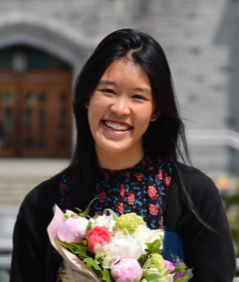Meet Sophia Ly, the latest UBC medical school students choosing BCCPC as the site for their FLEX project. Sophia is contributing to a project that will ultimately improve the lives of British Columbians living with serious illness.
“My work is to compile a database of self-management guides that are available online,” explains Sophia. “There is no shortage of online resources, but an inventory of high-quality resources doesn’t exist. My project is to identify resources and rate them on whether they are accessible for a lay person to understand, and whether they offer practical recommends about actions the patient can take to improve the quality of their life.”
Good self-management support has been shown to improve patient dignity and quality of life for people living with serious illness.
Sophia’s project is part of a larger undertaking by the Centre, to develop a user-friendly, patient-centred tool for British Columbians living with serious illness.
To date, Sophia has identified 171 resources in the form of websites, booklets, videos or online modules on living with conditions such as cancer, dementia, heart failure, kidney failure, and neuromuscular disease. All had good information about self-management of the disease in question, but fewer than half – 40% — passed the threshold for patient accessibility and actionability (that is offered practical action-oriented recommendations.
“I like that my work will contribute to the larger project,” says Sophia. “I felt connected to the practice of palliative care after a recent elective and I’m now looking at it as a possible career path.”
“Since I’m interested in working with this population, I was looking for opportunities in this area for my FLEX project, and connected with BCCPC’s research manager, Joshua Black. Joshua and Eman could not have been more supportive. Often with other research projects, it can be really difficult to get feedback, but Joshua and Eman were always responsive and helpful.”
Sophia’s project will not only benefit the work of the Centre, but her future patients as well.
“I was aware there was good information online, but had no idea how much there was,” she explains. “Not only am I finding resources for the database, but I’ve flagged info to use when I start practicing. In fact, I’ve already shared some with my fellow students and even some family members!”

